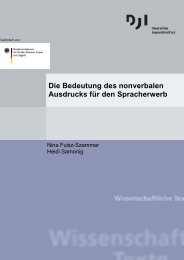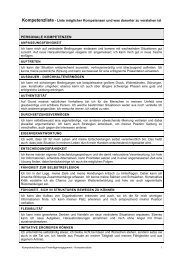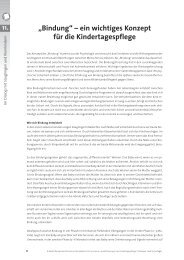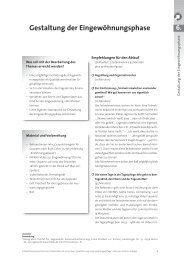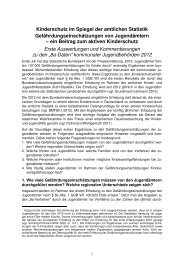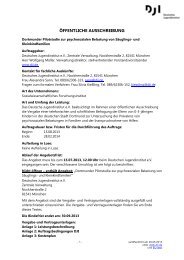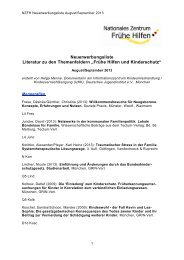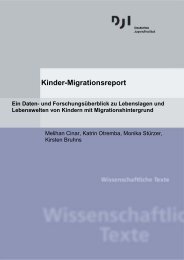download - Deutsches Jugendinstitut e.V.
download - Deutsches Jugendinstitut e.V.
download - Deutsches Jugendinstitut e.V.
Create successful ePaper yourself
Turn your PDF publications into a flip-book with our unique Google optimized e-Paper software.
Presentation France<br />
Philippe Choffell, Head of Department<br />
Observation and Planning<br />
Yves Goepfert, Head of Programme<br />
“Réussite éducative”<br />
Frédéric Bourthoumieu, GIP Centre<br />
Essone, Réussite Educative de<br />
Courcouronnes<br />
“Réussite educative à la DIV” –<br />
Educational programme for<br />
young people in problematic urban districts<br />
Introduction of programme “Réussite éducative”<br />
P. Choffell Y. Goepfert F. Bourthoumieu<br />
Urban policy is a partnership policy which was created in France around twenty years ago<br />
to improve the integration of problematic city districts within urban development. Within<br />
the framework of this policy, urban projects and also economic, cultural and social<br />
measures have been developed for priority areas which have been classified as such on the<br />
basis of contracts between the state and corporate bodies. These contracts, previously<br />
termed “contrats de ville” [city contracts], expired on 31 December 2006 and were replaced in<br />
January 2007 by the so-called “Urban Contracts for Social Cohesion” (CUCS) which are<br />
staggered to run up to 2012. These three-year contracts are renewable and are drawn up by<br />
the state and the relevant mayor in cooperation with other associative bodies<br />
Urban policy is currently based on a framework and on opportunities for action which<br />
were renewed by the Urban Renewal Laws dated 1 August 2003 and complemented by<br />
laws governing the programming of the support for social cohesion dated 18 January 2005,<br />
the equal opportunity laws dated 31 March 2006 and the laws concerning the national<br />
commitment for housing construction dated 13 July 2006.<br />
The Prioritised Geography of Urban Policy<br />
The so-called “Pact for Urban Renewal”, laws dating from 1996, stipulates a series of<br />
priority areas – the so-called “sensitive urban regions” (ZUS). This list continues to be<br />
utilised, although further areas have been named either in city contracts or in the CUCS<br />
which have extended and updated the geographical list specifically through the addition of<br />
areas in which prevention measures are necessary to avoid a deterioration of local<br />
conditions.<br />
The Pact for Urban Renewal defines 751 ZUS regions which are categorised within<br />
three priority levels according to the relevant social and urban problems. 416 zones listed in<br />
the Urban Revitalisation Zones (ZRU) have been categorised as medium priority. 44 socalled<br />
Urban Tax-free Zones (ZFU) have been designated as high-priority zones in which<br />
the establishment of companies and employment is to be supported through exemption<br />
from taxes and social contributions. Subsequently, the total of ZFU increased in 2004 and<br />
also 2007, reaching a total of 100.<br />
ZUS, ZRU and ZFU can be found in both in mainland France and its overseas<br />
departments (Martinique, Guadeloupe, Guyana and Réunion). According to the most<br />
56




